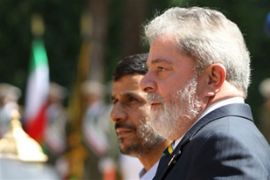Turkey hosts Iran fuel-swap talks
Foreign ministers of Iran, Turkey and Brazil meet in Istanbul to discuss uranium swap.

Speaking ahead of the meeting with Mottaki, Davutoglu and Amorim said they believed a diplomatic solution to the standoff could be reached.
The Turkish foreign ministry released a statement saying that the talks were arranged after Mottaki “expressed his desire to meet both (Davutoglu and Amorim), taking advantage of the Brazilian foreign minister’s trip to Turkey.”
Deal dead?
| in depth | |||||||||||||||||||||
|
The Iranian government has confirmed that Mottaki had spoken to Davutoglu and Amorim by telephone on Friday, suggesting that it has not given up on the deal despite the sanctions.
Al Jazeera’s Anita McNaught, reporting from Istanbul, said that despite potential difficulties, the framework of the deal was so far being adhered to.
“Up until now, the agreement has been followed pretty much to the letter,” she said.
She said Turkey was anxious not to be seen as taking the Iranian side in the dispute. “The Turks are keen to reiterate that they are not defending Iran per se, but only its rights as a sovereign nation,” she said.
Under the terms of the agreement, Iran will transfer 1200 kg of low-enriched uranium to Turkey and receive 120kg of 20 per cent enriched uranium for use in a medical research reactor within a year.
At the time it was agreed, the US and its allies said that the deal did not see Iran giving up enough of its low enriched uranium and pushed ahead with imposing a new round of UN backed-sanctions.
Turkey and Brazil voted against the new sanctions because they felt that their deal made the measures unecessary.
The latest UN sanctions were followed by unilateral punitive measures from Washington, and on Thursday the European Union agreed on a package of punitive measures targeting Iran’s energy sector.
Despite the new sanctions, Iran has said that it is prepared to return to the negotiating table for talks with world powers subject to certain conditions being met, but not before the end of August.
